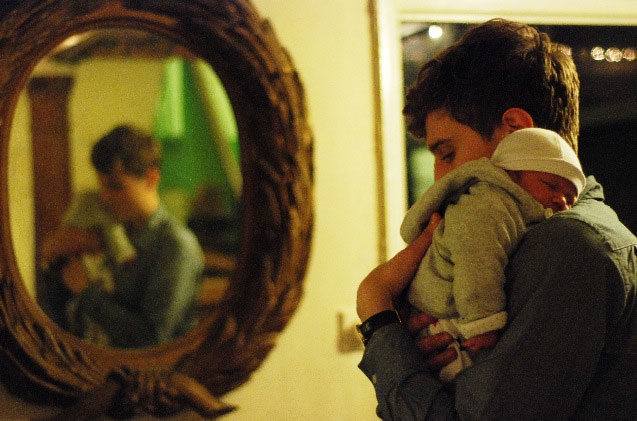
Image by Helena Lopes/Unsplash, Public Domain Dedication (CC0).
What If We Could Be Our Whole Selves at Work?
The first time I told an employer that I was pregnant, this is how it went down:
Sheepish smile creeping onto my face: “I have something to tell you…”
“Just don’t tell me you’re pregnant.”
Record scratch.
Keep in mind, that employer was a woman with three kids of her own. We laughed about it, but the underlying message was clear and, frankly, brutal to someone who has always prided herself on being low-maintenance and high-achieving at work: a baby has no place here.
Look, it’s not like I actually thought I would be able to bring my baby to work (though, on-site daycare seems pretty dang smart to me for all kinds of reasons). It’s just that, before becoming a mother, I had no idea how much pressure I would feel to show up at work washed clean of my identity as a parent.
I don’t mean just making sure there’s no spit-up on my blazer (though I sometimes fail at that). I mean getting freaked out when I’ve written a lot about mothering in this very column because I’m worried that people will label me a “mommy blogger.” I mean making my need to pump as discrete as possible (I’ve pumped in an interview booth at an investigative reporting shop, in a nun’s tiny bedroom, on the floor of myriad corporate offices, in a port-a-potty, in my car, and even inflight in my seat). I mean trying not to flinch when an employer casually mentions scheduling a meeting on the days I have my girls or the possibility of an overnight work trip.
I mean not referencing the constraints I face because of my kids, generally. I not only feel like I’m putting myself at professional risk, but like I’m screwing over the sisterhood; if this employer decides working moms are slackers because of me, they might not want to hire another one.
And keep in mind, I have the most cushy situation imaginable. I’m a freelancer, so I have multiple employers. If one decided to dump me because of the complexities of my working-mom hustle, I’d have others I could still depend on — unlike so many women who are at the whims of one boss. In theory, I also collaborate with the kinds of people who share my values, one of which is that people shouldn’t have to choose between meaningful, paid work and being present parents. And yet…
I still feel like I have to painstakingly code-switch between work and home. There are so many challenging structural barriers to being a working parent, but what I’m talking about here is the big, exhausting cultural one. It’s 2017, I’m economically secure (as much as any freelancer can be), surrounded by progressive collaborators and do work that I love, and still, I’m haunted by the sense that I will be seen as less, not more, if I show up as my whole self at work.
I’ve been either pregnant or nursing for over four years now, and I’ve worked the whole time with the exception of about four months, so I’ve had lots of time to experiment with owning my mother identity in work settings. So often, people are sweet about the actual existence of my daughters (commenting on how cute they are or asking after their wellbeing), but if they start to encroach on our professional space in some way (like getting sick when I am supposed to be on a conference call), the sweetness quickly turns to irritation — can’t someone else deal with that?
It’s almost like I’m in the theater. If I mention my kids — not as the cute stars of my Instagram, but real, messy humans with competing needs — I break “the fourth wall.”
I write this now, as vulnerable as it makes me feel, because I imagine other working moms feel this way and because this is not about working moms at all. It’s about anyone who doesn’t feel like they can acknowledge the real shit going on in their lives at work — people who are taking care of their aging parents or a disabled relative or friend, people who have a chronic illness, people who struggle with depression or are grieving for some reason. All of us, at one time or another, will contend with an unpredictable balance of the work we do and the people we care about, or the miraculous but imperfect bodies we inhabit. And most of us, I would venture a guess, don’t feel like we can be real about that with the people we work with or for.
Why are work and caretaking still so juxtaposed in American society? Why do we still expect one another to show up to work as if our bodies never fail or our hearts never break?
The truth is, I work ten times harder for the employers and collaborators who make me feel like I can show up as my whole self. When I feel safe to tell them when I need something (to be left alone right after my baby is born, a room to pump in, some forewarning on calls so I can arrange childcare), it grows a fierce loyalty in me. I want to be excellent for them, even if there is some undeniable level of unpredictability in my life. And I, of course, want to acknowledge their whole selves — whatever is going on behind that “fourth wall” for them.
I can just hear the opposition in my head now:
Work is work. You’re delusional if you think employers, who have to tend to the bottom line, are going to make special exceptions for you tending to your kids. It’s a slippery slope. If they let you duck out of conference calls when the babysitter flakes, where do they draw the line for others?
But I just don’t think life, much less “the bottom line,” actually works like this. I think that childless, healthy men take all kinds of liberties with their schedules that are thought of as totally acceptable because they have seniority and/or are being strategic in some way about what they need in order to be top performers (like not being expected to reply to emails until a certain time of the day or taking weeks off to climb mountains). It’s unclear to me why being a super-committed cyclist or marathon runner, for example, are seen as valiant demonstrations of someone’s potential strength and determination at work, while birthing and nurturing a baby is still seen, whether we’re willing to say it out loud or not, as a distraction.
It hasn’t always been this way. Which means it doesn’t have to be this way in the future. In Working Women, Workable Lives, the authors write:
“Prior to industrialization, children grew up in the midst of an adult world, with work happening all around them. Mothers and their children were not segregated off in their own shadowy world, separate and unequal, existing as mere reflections of the ‘real’ work going on in the ‘real’ world.”
I don’t want to turn back the clock so much as reclaim what’s real. Hungry babies are real. Aging parents are real. Bodies, brains, and hearts break, for real. We can’t be authentic, compassionate people in our professional lives unless we’re willing to acknowledge this reality. And when we do, far from preventing us from being productive or creating some kind of slacker contagion, we make people feel whole. When people feel whole, they do amazing work. Or at least that’s what this nursing, writing, healing, conference calling, cleaning, advising, cooking, strategizing, caring human believes.


Share your reflection